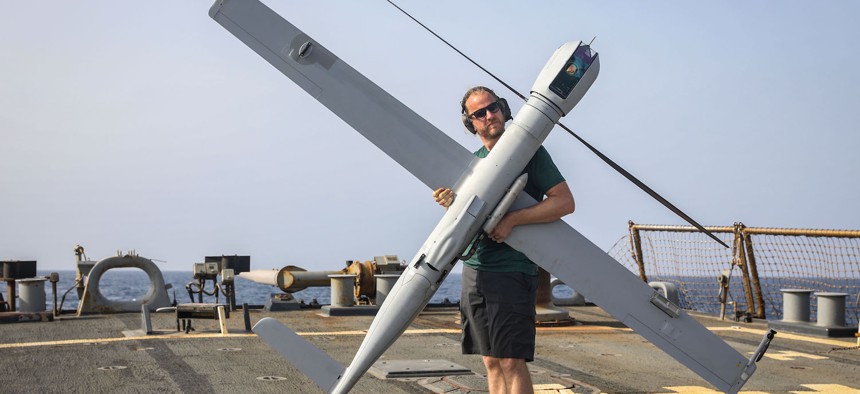New board will help Navy ‘absorb’ new tech into real-world ops

Michael Uridil places a Flexrotor long-range robotic aircraft on the flight deck of the guided missile destroyer USS McFaul (DDG 74) during flight operations, July 23, 2023. U.S. Navy / Mass Communication Specialist 2nd Class Juel Foster
Science and Technology Board will examine “issues posed by the development of generative artificial intelligence”—like ChatGPT—as well as a range of other technologies.
What can sailors and Marines do with robots and artificial intelligence? The Navy’s new Science and Technology Board wants to help them figure it out.
“Our department is faced with a unique set of challenges given our charge to operate across multiple domains, and we are looking to you to inject fresh perspectives in addressing those challenges,” Navy Secretary Carlos Del Toro told the board Friday, before its first meeting.
The 17-member board will work with the Navy and Marine Corps to “absorb” and adapt science and tech into their operations, Richard Danzig, the board’s chairman and a former Navy secretary, told reporters ahead of the meeting.
“So we're very focused on trying to look at real-world problems in the Navy and Marine Corps, and the ways in which the insiders in the organization, the admirals and generals who lead it and the sailors and Marines who operate on the deck plates …what are they doing to absorb these new technologies, and how can we help in that,” Danzig said Sept. 20. “And as a group of outside civilian experts, maybe we can amplify their efforts, validate some of them, suggest alternatives, that sort of thing.”
One effort already underway that the board may examine and expand, Danzig said, is Task Force 59, which is experimenting with unmanned naval systems and AI in the Middle East.
The board will need time to formulate its priorities, but is also likely to look at “robotics and autonomy,” Danzig said.
“With coming to grips with some of the issues posed by the development of generative artificial intelligence,” he said. “And I think we'll also be thinking about [a] range of other things that are less popular, less salient, in the press today, but may become more salient in times ahead. As for example, in context like oceanography, or the significance of communications innovations.”

